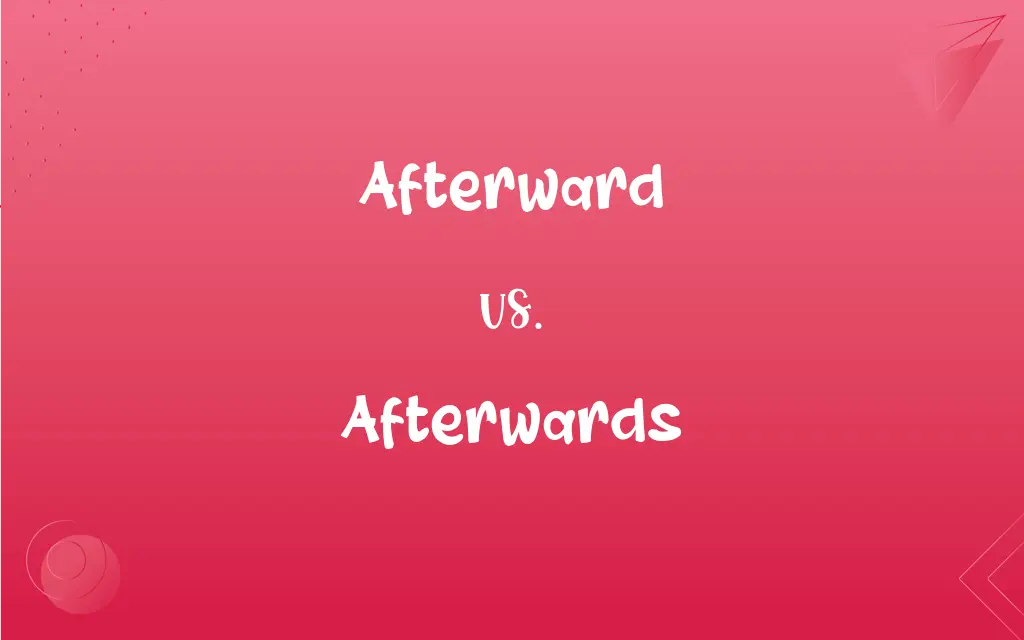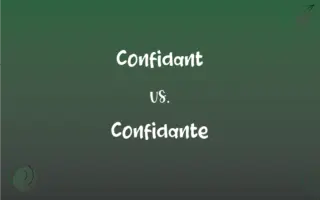Afterward vs. Afterwards: What's the Difference?
Edited by Aimie Carlson || By Harlon Moss || Updated on October 18, 2023
Both mean "at a later time," with "afterwards" being more common in British English and "afterward" in American English.

Key Differences
The terms afterward and afterwards both refer to a subsequent time or after a particular event has occurred. While these adverbs share the same meaning, their usage slightly varies based on regional preferences. In American English, afterward tends to be the more favored term, while afterwards sees more usage in British English.
Delving deeper into afterward and afterwards, both words can be seamlessly interchanged in sentences without changing the message conveyed. For example, stating "I went to the store and met my friend afterward" and "I went to the store and met my friend afterwards" mean precisely the same thing. Both afterward and afterwards convey the notion of something happening subsequent to a specified event.
The history of English language evolution has gifted us with numerous such pairs, where both versions coexist with minute variations, often influenced by regional dialects and preferences. Afterward and afterwards fit into this category, where both forms have been in use since the Middle Ages, with neither being incorrect or more correct than the other.
In essence, choosing between afterward and afterwards is largely a matter of style or regional influence. While writers or speakers might have personal preferences, it's crucial to note that using one over the other won't typically lead to misunderstandings. Both afterward and afterwards serve as tools to reference a time following a specific event, and the choice between them boils down to personal or regional tendencies.
Comparison Chart
Meaning
Refers to a time following a specific event
Same as "afterward"
ADVERTISEMENT
Usage
More common in American English
More common in British English
Flexibility
Can be used interchangeably with "afterwards"
Can be used interchangeably with "afterward"
Ending
Ends with "-ward"
Ends with "-wards"
Origin
Both forms have been in use since the Middle Ages
Same as "afterward"
Afterward and Afterwards Definitions
Afterward
At a later time or subsequent to a particular event.
We had lunch; afterward, we went for a walk.
ADVERTISEMENT
Afterwards
At a subsequent time or after a particular event.
We had a meeting; afterwards, we had coffee.
Afterward
In the time following an action.
I studied for hours and took a nap afterward.
Afterwards
In the span of time after an event.
The seminar was informative; many stayed to network afterwards.
Afterward
Following a specific occurrence.
The movie was boring; we left afterward.
Afterwards
Following on from a specific occurrence.
The play was excellent; we discussed it afterwards.
Afterward
Subsequent to a point in time.
The rain stopped, and the sun appeared afterward.
Afterwards
In the time that follows an action.
She sang a song, and we applauded afterwards.
Afterward
In the period after an event.
He gave his speech and sat down afterward.
Afterwards
Subsequent to a given moment.
He shared his plan and answered questions afterwards.
Afterward
At a later time; subsequently.
Afterwards
At a later time; subsequently.
Afterward
(US) afterwards
Afterwards
(temporal location) At a later or succeeding time.
Afterward
Happening at a time subsequent to a reference time;
He apologized subsequently
He's going to the store but he'll be back here later
It didn't happen until afterward
Two hours after that
Afterwards
At a later or succeeding time.
Afterwards
Happening at a time subsequent to a reference time;
He apologized subsequently
He's going to the store but he'll be back here later
It didn't happen until afterward
Two hours after that
FAQs
Can I use afterward and afterwards interchangeably?
Yes, they are interchangeable in terms of meaning.
Are both forms grammatically correct?
Yes, both afterward and afterwards are grammatically acceptable.
How does afterwards differ from afterward?
Afterwards is more common in British English, while afterward is favored in American English.
Which form should I use in academic writing?
Either can be used, but it's essential to be consistent throughout the text.
Why might someone prefer one form over the other?
Preference can be based on regional influences or personal style.
Is there a trend in the usage of these terms?
Usage can vary based on regions and changing linguistic preferences.
Why are there two versions of the word?
Language evolution has led to variations, often influenced by regional dialects.
Does the difference between afterward and afterwards affect comprehension?
No, both words convey the same meaning.
Is the "-wards" ending common in British English?
Yes, similar pairs exist like "toward" (American) and "towards" (British).
In what contexts are afterward and afterwards typically used?
They're often used in narratives or descriptions to indicate a sequence of events.
Are there synonyms for afterward and afterwards?
Yes, synonyms include "later", "subsequently", and "then".
Can either word be used in formal correspondence?
Absolutely, both words are appropriate for formal contexts.
What does afterward mean?
Afterward refers to a time following a specific event.
Is one form more formal than the other?
No, both forms are equally formal.
How long have both forms been in use?
Both forms have been in use since the Middle Ages.
How can I remember the difference?
Recall that "afterward" is American, and "afterwards" is British.
Are there other similar pairs in English?
Yes, such as "toward/towards" and "forward/forwards".
Do other languages have such variations?
Many languages have dialectal or regional variations in words.
Does the choice of using afterward or afterwards affect the tone of a sentence?
No, the tone remains unchanged regardless of the choice.
Can I start a sentence with afterward or afterwards?
Yes, both can be used at the beginning of a sentence.
About Author
Written by
Harlon MossHarlon is a seasoned quality moderator and accomplished content writer for Difference Wiki. An alumnus of the prestigious University of California, he earned his degree in Computer Science. Leveraging his academic background, Harlon brings a meticulous and informed perspective to his work, ensuring content accuracy and excellence.
Edited by
Aimie CarlsonAimie Carlson, holding a master's degree in English literature, is a fervent English language enthusiast. She lends her writing talents to Difference Wiki, a prominent website that specializes in comparisons, offering readers insightful analyses that both captivate and inform.































































